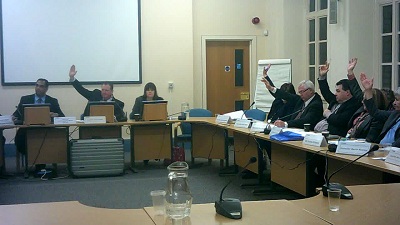Incredible: Wirral Council officer states to EFA that special schools’ minimum funding guarantee is “unaffordable”

Labour councillors at a public meeting of Wirral Council’s Coordinating Committee vote to consult on closing Lyndale School (27th February 2014)
I received a response yesterday from the Education Funding Agency to my Freedom of Information Act request about Wirral Council’s application for an exemption from the minimum funding guarantee (that was later withdrawn).
Wirral Council assumed it would make a successful application for an exemption from the 98.5% minimum funding guarantee. This was what led to the predicted shortfall in Lyndale School’s budget of £72,000 for 2014/15. This application was later withdrawn (before the Education Funding Agency reached a decision on it) which led to Lyndale School’s financial forecast for 2014/15 changing from a deficit to a surplus.
The detail of the rationale behind the application is interesting though and is included below. It seems to it was emailed to the Education Funding Agency by an Andrew Roberts (Senior Manager, School Funding & Resources). The date of the email isn’t included, however I’ve submitted an internal review request for that too.
What’s interesting is that it in the application Andrew Roberts states “However proposals include a contingency fund to financially support any specialist provision that may experience financial difficulties.” However at the Coordinating Committee meeting of the 27th February the eight Labour councillors voted against an amendment (six voted for the amendment who were the Lib Dem councillor, five Conservative councillors and the parent governor rep) proposed and seconded by the Conservative councillors that was “We would like to seek assurance that the required contingency funding is in place to top up the special educational funding to ensure that the level of funding required for the best care and education is provided for all children.”
Wirral Council’s Andrew Roberts also states “Without capping the MFG (minimum funding guarantee) costs an additional £800,000 which would be unaffordable, whilst capping would defer the introduction of the new top-up structure.”
This however seems to contradict what Surjit Tour stated at Budget Cabinet on the 12th February 2014 in his advice to Cabinet deciding on their recommendation to Council for the Schools Budget for 2014/15 (I’ve underlined the relevant section of what Surjit Tour said) which was
“Queries have been raised with regards to whether there is an impact on the outstanding call in, in relation to the Schools Budget which may have a direct impact.
One of them in particular is the proposals for changes to the school’s top up payments for schools with high needs. Members will be aware that the matter is to be considered by the Policy and Performance Coordinating Committee on the 27th February. The position with regards to the proposed Schools Budget is that it includes a contingency provision and that provision is considered sufficient to meet any potential financial implications that may arise as a result of the forthcoming call in hearing and therefore you can agree the, the proposed budget is both sufficient and sufficiently flexible to address any potential implications that may arise and that therefore means that the budget can be proposed to Council forthwith.”
The contingency referred to was for £908,900. At this point you might point out that £908,900 is more than enough to cover the £800,000 extra needed by the minimum funding guarantee. However if you read this report to the Wirral Schools Forum meeting of the 22nd January 2014 it states what the £908,900 contingency is planned to be used for and I quote:
Contingency. The contingency identified of £908,900 is required to cover the potential costs of:
- Adjustments with the EFA for post 16 students. There are ongoing discussions about the costs of mainstream school and academy High Needs places (£6,000 per place) which potentially will cost £372,000
- Any unforeseen consequences arising from the implementation and review of High Needs Top Ups.
- Unfunded growth in place numbers – there has been a small net increase in the planned number of High Needs places
- Any mismatch between places identified with providers and places taken up.
- Inflationary pressures within Non Maintained Special Schools.
- Uncertainty about the overall statement numbers
So with Wirral Council officers stating that funding Lyndale School is first “unaffordable”, then another officer stating that “provision is considered sufficient to meet any potential financial implications” is it any wonder that people are confused on this point?
The minutes of the Coordinating Committee deciding the call in state “The Committee noted that the minimum funding guarantee was now more affordable, therefore the application for an exemption from this requirement had been withdrawn.”
How can it be “more affordable” though? Has the designation of what the contingency fund to be used for changed from what was agreed by the Wirral Schools Forum in January (as outlined above) to a decision behind the scenes to withdraw the minimum funding guarantee exemption application and use the contingency to fund the minimum funding guarantee? Is the reason why funding is no longer mentioned with regards to Lyndale School because officers stated (at different times) that it was both affordable and unaffordable (and as the underlying budget hasn’t changed both positions can’t both be accurate can they)?
Wirral Council’s Julia Hassall now says that the consultation on closing Lyndale School is because of pupil numbers as there are twenty-three children at the school which has a capacity for forty. Following the review by Eric Craven there was a reduction in the planned admission number for Lyndale School last year from forty-five to forty. I’m sure Wirral Council (if it wanted to) could reduce the planned admission number at Lyndale School for future years to a lower number such as thirty or twenty-five.
Wirral Council’s policy on the admission arrangements for primary schools for 2015-16 was agreed by Cabinet last Thursday. In it it states at “3.5 Special Needs. All schools will be required to admit a pupil with a Statement of Special Educational Needs naming the school.”
Therefore if Wirral Council started naming Lyndale School in SEN statements, rather than sending more pupils to oversubscribed special schools such as Elleray Park (currently with 91 pupils and 80 places) wouldn’t this help increase numbers at Lyndale towards its place figure of forty?
What’s interesting is that money was put in the budget for next year to increase the numbers of places at Elleray Park by ten. So why can’t Wirral Council agree to reduce the number of places at Lyndale School by ten?
Below is Wirral Council’s application (later withdrawn) from Andrew Roberts for an exemption from the minimum funding guarantee which guarantees that schools receive at least 98.5% of the money they received the previous year.
——————————————————————————————————-
This letter is requesting exemption from the requirement for an SEN MFG included within the 2014 – 2015 DSG additional conditions of grant. Paragraph g “In deciding on top up funding rates for the pupils it will place in special schools …. and the total number and type of places received the same in the 2 financial years the school or Academy budget would receive by no more than 1.5% in cash between 2013 – 2014 and 2014 – 2015.”
Over the past 12 months a Schools Forum SEN finance group has met to develop proposals for high needs funding and particularly to agree a banded approach for specialist SEN provision.
A banded system (with 5 bands) was developed taking account of a number of issues:
- The need for stability
- The fluctuation arising from part year places and the need to have places available.
- To take account of the increasing demands and population with social communication needs and to recognise the resource intensive nature of provision for children with profound and multiple learning difficulties.
These 5 bands have also been applied to SEN resourced base provision in mainstream schools and academies. The bands used take account of the same needs identified within Wirral’s 11 special schools and in addition gives an equivalent level of funding for each child.
Changes of this nature will result in movement of resources and a number of schools will as a result receive more funding and others will receive less. However proposals include a contingency fund to financially support any specialist provision that may experience financial difficulties.
The SEN top up proposals were subject to a full consultation with all schools and providers in Wirral, commencing on 3rd July and closing on 18th October. The consultation papers included an illustration for each school of the funding a school might receive using current numbers and numbers at capacity, compared with the level of funding provided in 2013 – 2014. In addition there has been a series of meetings with schools to discuss the changes suggested.
24 responses were received including 10 out of 11 special schools and 6 out of 14 school SEN resource bases. Overall the responses were supportive and in favour of the local authority’s proposals.
Since the consultation was launched schools were asked a supplementary question about views on seeking an exemption from the requirement for an SEN MFG. This approach has been adopted because the MFG will not work with the new top up bands. Without capping the MFG costs an additional £800,000 which would be unaffordable, whilst capping would defer the introduction of the new top-up structure.
Schools were asked for their preferences based on a table illustrating:
No MFG (7)
An Average MFG (phased over 3 years) (5)
A full MFG (0)
The responses are shown in brackets above.
This issue was discussed at the Schools Forum meeting on 13th November 2013. The recommendation from the forum was “That Forum supports an application to the EFA for an exemption from the requirement to use an MFG (Option 1) on Top Ups for 2014 – 2015, and failing that Forum request the EFA agree the use of an average MFG (Option 2)”
A number of papers are attached to this e-mail including:
School Forum Agenda from 13 November 2013:
– Element 3 Top up funding arrangements for pupils with high needs (SEN) and for pupils attending Alternative Provision. (This report includes the consultation paper and letter to schools about the MFG)
– An extract from the Schools Forum minutes
Please let me know if you would like further details.
I look forward to hearing from you
Yours sincerely

Andrew Roberts
Senior Manager – School Funding & Resources
Children and Young People’s Department
Wirral Council
Tel: 0151 666 4249
Fax: 0151 666 4338
andrewroberts@wirral.gov.uk
Visit our website: www.wirral.gov.uk
This transmission is intended for the named addressee(s) only and may contain sensitive or protectively marked material up to RESTRICTED and should be handled accordingly. Unless you are the named addressee (or authorised to receive it for the addressee) you may not copy or use it, or disclose it to anyone else. If you have received this transmission in error please notify the sender immediately. All GCSX traffic may be subject to recording and/or monitoring in accordance with relevant legislation
This email was received from the INTERNET and scanned by the Government Secure Intranet anti-virus service supplied by Vodafone in partnership with Symantec. (CCTM Certificate Number 2009/09/0052.) In case of problems, please call your organisation’s IT Helpdesk.
Communications via the GSi may be automatically logged, monitored and/or recorded for legal purposes.
If you click on any of the buttons below, you’ll be doing me a favour by sharing this article with other people.
53.402022-3.070415




